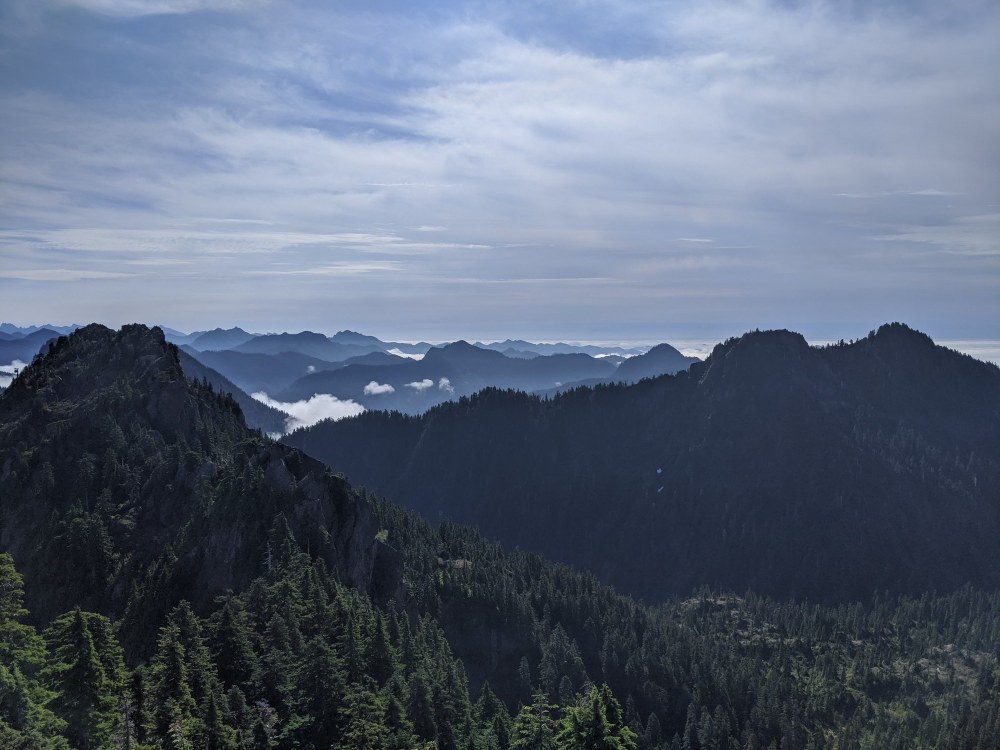
One of the ways we advocate to protect public lands and the outdoor experience is by engaging in federal land management processes like the Northwest Forest Plan.
Last week the U.S. Forest Service established and appointed a new Federal Advisory Committee for sustainable, climate-adapted, wildfire-resilient landscapes on Pacific Northwest national forests. The Mountaineers Conservation & Advocacy Director Betsy Robblee was selected by the Secretary of Agriculture to serve a two-year term on the 21-member committee, consisting of leaders representing various levels of government, Tribal Nations, academia, and non-profit conservation organizations.
The group will advise the Forest Service and provide recommendations on how to modernize landscape management across the Northwest Forest Plan area, which covers 19 million acres of federally-managed lands in western Washington, western Oregon, and northwestern California. It’s a big deal for the outdoor recreation community to have a seat at the table during this high-profile management process.
Betsy will represent the outdoor recreation community as the committee develops recommendations for updating the Northwest Forest Plan. The Committee will provide advice and recommendations to ensure that national forests are managed sustainably, adapted to climate change, and resilient to wildfire, while meeting the needs of local communities. She’ll strive to harness our community’s passion and connection to these special places during the committee’s work.
What’s the Northwest Forest Plan and Why is it Important
Enacted in 1994, the Northwest Forest Plan is a science-based ecosystem management plan that was created to resolve intense controversy over the effects of old growth logging on fish and wildlife. It limits logging to certain areas in order to protect wildlife, old growth forests, and stream corridors. The plan governs the management of 17 national forests across the Northwest.
The Northwest Forest Plan was intended to manage forests for sustainable timber production and biological diversity protection; coordinate federal agencies and advice from non-federal interests; and initiate economic assistance and job retraining for displaced timber workers and communities. For nearly thirty years, the Northwest Forest Plan (NWFP) has been the guiding framework for old growth forest preservation and ecosystems in the western Cascades. Many of the key elements of the NWFP also enhance recreation on public lands by conserving the magnificent old growth forests that host many of our outdoor experiences.
While many elements of the plan have withstood the test of time, the Pacific Northwest now faces new challenges. The climate and biodiversity crises require us to consider new, scientifically-informed approaches to ensure that our forests are more resilient to the increasing threats of wildfire, floods, and drought, while supporting local communities and Tribal rights.
Representing The Recreation Community
Outdoor recreation is the primary way that people experience their national forests. Mountaineers members and the larger human-powered recreation community in Washington observe first-hand the loss of biodiversity and degradation of wilderness due to climate change and the increasing human footprint on the landscape. Recreationists have a deep desire to be part of a more sustainable future for our region’s forests.
Betsy was motivated to serve on the committee because she strongly believes it is essential that land management and forest planning recognize the social value of the landscape in addition to its ecological value. With her appointment, we now have a unique opportunity to reinforce current protections and center climate resiliency in future management of our Northwest forests.
Protecting Old Growth and Mature Forests
Protecting our nation’s old growth and mature forests is an important part of leveraging our public lands and waters as nature-based solutions to the climate crisis. It’s also a top climate priority for the Administration: a 2022 executive order announced steps to preserve and protect old growth forests and the Inflation Reduction Act provided $50 million for the Forest Service to complete an inventory of old growth and mature forests on their lands.
Mountaineers have offered valuable feedback as a part of the Northwest Forest Plan process in the past, and there will be more opportunities to weigh in moving forward. We’ll keep you updated as the Federal Advisory Committee process unfolds and share additional ways to engage, especially when it comes to protecting old growth forests.
Look out for an upcoming blog post sharing more about the Administration’s efforts to protect old growth and mature forests.
 The Mountaineers
The Mountaineers